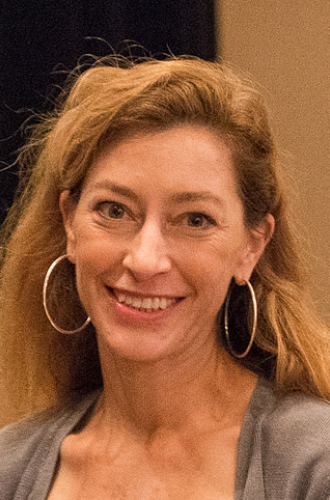-

-
Jennifer A Maynard
Professor
McKetta Department of Chemical Engineering, Biomedical Engineering
Z. D. Bonner Professorship of Chemical Engineering (Holder)-
Professor Jennifer Maynard develops protein vaccines and therapeutics to address unmet medical needs in infectious diseases. This involves identifying or designing a candidate protein, as well as determining its mechanism of action at the molecular level, using in vitro and in vivo experiments. While this work relies heavily upon protein biochemistry skills, it also uses biotechnology, microbiology, immunology and cellular biology skills.
She earned a B.A. in human biology from Stanford University, a Ph.D. in chemical engineering from UT Austin and completed post-doctoral studies at Stanford. She has developed two separate antibody therapeutics to treat infectious disease from initial engineering and biochemical characterization through animal studies, including non-human primates. Her students often pursue careers in the biotechnology and pharmaceutical industries directly after graduation.
-
The Maynard lab develops protein therapeutics and vaccines to address unmet medical needs in infectious diseases, with a focus on Bordetella pertussis and cytomegalovirus as target pathogens. These proteins aim to directly interfere in disease progression or augment essential immune system activities. This work involves discovery of antibodies binding target molecules to exert a therapeutic effect, design of proteins able to exert novel therapetuci mechanisms, protein production in recombinant expression systems, biophysical and biochemical analyses to elucidate the molecular basis of activity and, ultimately, in vitro and in vivo experiments to evaluate a protein's therapeutic potential in the context of a complex organism.
Our specific research goals are to:
- Engineer advanced antibody therapeutics, for instance, pathogen-resistant antibodies and antibodies able to localize to the site of disease.
- Harness and redirect cellular immune responses towards virally-infected cells through manipulation of antibodies and T cell receptor-peptide MHC interactions.
- Understand mechanisms of protective immunity to Bordetella pertussis, focusing on secreted toxins and adhesins, and use this information to engineer more effective vaccines and therapeutics.
-
Qerqez AN, Silva RP and Maynard JA. Outsmarting pathogens with antibody engineering. Annual Review Chem & Biochem Eng, Volume 14, 2023.
Silva R,* Huang Y*, Nguyen AW*, Hsieh C-L, Olaluwoye OS, Kaoud TS, Wilen RE, Qerqez AN, Park JG, Khalil AM, Azouz LR, Le KC, Bohanon AL, DiVenere AM, Liu Y, Lee AG, Amengor D, Shoemaker SR, Costello SM, Padlan EA, Marqusee S, Martinez-Sobrido L, Dalby K, D’Arcy S, McLellan JS, Maynard JA. Identification of a conserved S2 epitope present on spike proteins from all highly pathogenic coronaviruses. Elife, 12:e83710 (2023).
Liu Y, Lee AG, Nguyen AW*and Maynard JA*. An antibody Fc engineered for conditional ADCC at the low tumor microenvironment pH. JBC, 298(4):101798 (2022).
Silva R, DiVenere AM, Amengor A, Maynard JA. Antibodies binding diverse pertactin epitopes protect mice from B. pertussis. JBC, 298(3): 101715 (2022).
Liu, Y, Nguyen AW* and Maynard JA*. Engineering antibodies for conditional activity in the solid tumor microenvironment. Curr Opin Biotechnol, 78:102809 (2022).
Goldsmith J, DiVenere AM, Maynard JA, McLellan JS. Structural basis for antibody binding to adenylate cyclase toxin reveals RTX-linkers are key neutralization-sensitive epitopes. Plos Pathogens. 17(9): e1009920 (2021).
Nguyen AW, DiVenere AM, Papin JF, Connelly S, Kaleko M and Maynard JA, Neutralization of pertussis toxin by a single antibody prevents clinical pertussis in neonatal baboons. Science Advances 6,eaay9258 (2020).
Wagner EK*, Qerqez AN*, Stevens CA, Nguyen AW, Delidakis G and Maynard JA. Human cytomegalovirus-specific T cell receptor engineered for high affinity and soluble expression using mammalian cell display. JBC, 294(15): 5790-5804 (2019).
Nguyen AW, Le KC, Maynard JA. Identification of high affinity HER2 Fab antibodies using CHO surface display. Protein Engineering Design & Selection 31(3): 91-101 (2018).
Wagner EK and Maynard JA. Engineering therapeutic antibodies to combat infectious diseases, Current Opinion in Chemical Engineering, 19:131-141 (2018).
Wagner EK, Wang X, Bui A, Maynard JA. Synergistic neutralization of pertussis toxin by a bispecific antibody in vitro and in vivo. Clinical & Vaccine Immunology, 23 (11): 851-862 (2016).
Nguyen AW, Wagner EK, Laber JR, Goodfield L, Smallridge WE, Padlan EA, Bristol A, Harvill ET, Papin JF, Wolf RF, Kaleko M, Maynard JA. A cocktail of humanized anti-pertussis toxin antibodies limits disease in murine and baboon models of whooping cough. Science Translational Medicine, 7(316): 316ra195 (2015).
-
- National Academy of Inventors, senior member
- Fellow of the American Institute for Medical & Biological Engineers
- University of Texas “Emerging Inventor of the Year” Award
- Bill & Melinda Gates Grand Challenge Awards
- Texas Exes Teaching Award for the Cockrell School of Engineering
- Student Engineering Council Teaching Excellence Award for Chemical Engineering
- Packard Foundation Fellowship in Science and Engineering
- Dreyfus Foundation New Faculty Award
- NIH F32 National Research Service Award
-
ChE 317, Introduction to Material & Energy Balances
ChE 322, Chemical Engineering Thermodynamics
ChE 338, Fundamentals of BioEngineering
ChE 363, Mass Transfer & Separations
ChE 379, Engineering Global Health
ChE 379/ 384, Quantitative Analysis of Cellular & Molecular Biology
-
Current Graduate Students:
- Dzifa Amengor (Micro)
- Laura Azouz Yuan (ChE)
- Rebecca Wilen (ChE)
- Alison Lee (CMB)
- Sam Blackman (ChE)
- Sumit Pareek (ChE)
- Kelli Hager (Micro)
- McKenna Flynn (Biochem)
- Agata Turula (ChE; co-advised with Lydia Contreras)
Senior Scientist:
- Dr. Annalee Nguyen (ChE PhD, UCSB)
-



